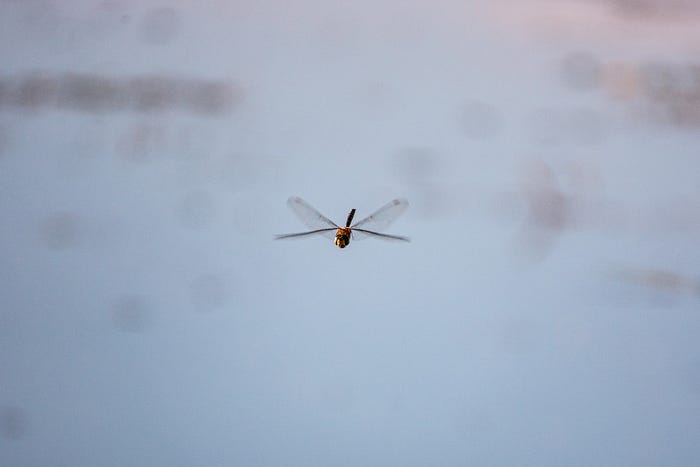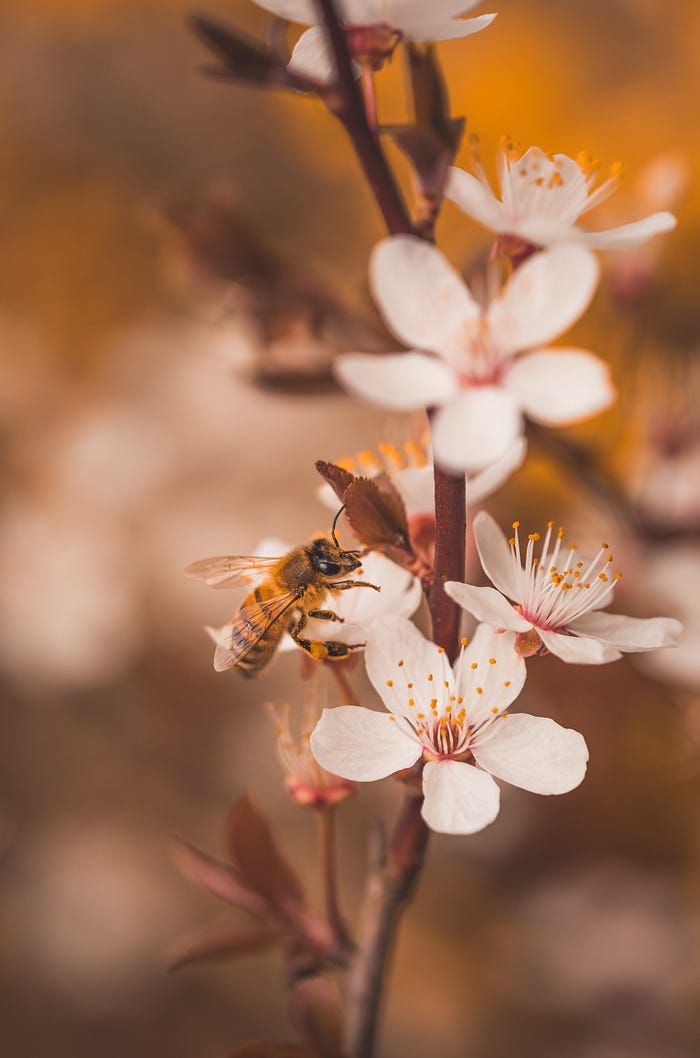The Insects Are Dying!

When I was much younger than I am now, in elementary school, I discovered that I did not like dragon-flys. And during the 30-minute breaks in recess what I would find in the green grasses of the school's fields were a wide array of bugs. Rollie Pollie’s, Ladybugs, Butterflies, Praying Mantis, and the dragon flys that would zoom above my curly-headed hair scaring me with their harmless flight.
And those times had cemented themselves to be positive childhood memories of where I grew up. Every year when the insects would come out after the winter and the sun began shining down on the other kids below. We did not realize, that the environment around us would change.
This year, when winter came to a close and the next season came into play. I found myself in an empty field, with a scorching sun and no bugs in sight.
You see, this isn't due to some supernatural insect monster in my hometown, or because some evil company came and started catching all the bugs either. The butterflies, dragon-flys, ladybugs, and all the other bugs stopped appearing because the climate they lived in, that I lived in, became increasingly more difficult for them to inhabit.
Climate change changes more than just the climate. It affects those that live in the climate as well. And when we can hide in our air-conditioned or fan-powered homes, the animals on the outside are left with the consequences of our actions.

Insect populations are decreasing, and this is not just happening in my own community but, across the planet. According to Pnas.org when looking at 16 studies done that studied insect populations, they had declined by in the last 4 decades by 45%. These numbers are devastating.
Insects, which tend not to come up in the conversation when we speak about animal loss from climate change are just as important as the monkeys, orangutans, and many other animals who for instance lose their homes due to deforestation which more commonly seen on the news. But because they get overlooked, we must highlight their losses even further.
There are 5.5 million species of Insects, making them the most diverse group of animals on the planet! And they make up 80% of that animal life, according to the Thompson Earth Systems Institute. These creatures which are very widespread do more for the environment than meets the eye.
Most of us know about bees being one of the world's greatest pollinators and they themselves are a very important piece in that. But the beautiful thing about insects is that they work together, over 100,000 animal species play a part in pollination.
And this is evident when for example, in a community or field of crops where bees pollinate, other insects may be pollinators there too to work together. And were something to happen to the bees in that area, say a tree branch fell and destroyed a beehive, the other insects in that area would fill in the gaps left by the bees. They are always working, always buzzing, always helping. It is ingrained into them to naturally fill in these gaps and keep the world turning.
But when the numbers are constantly decreasing and what causes the beehive to fall is the augmented rigor of the storms, or the faster and harsher winds caused by climate change there can only be so many insects to fill in so many gaps. And it is not their own fault, but it lies within our responsibility to do something about the problems we see.

Pollination
When we talk about pollination, that is where the conversation can hit closer to home. According to farmers.gov, “One out of every three bites of our food, including fruits, vegetables, chocolate, coffee, nuts, and spices, is created with the help of pollinators”.
Pollinators provide a service that is irreplaceable. In a DW Documentary I watched that explored the importance of insect life, they did a study on an apple tree orchard and investigated the effects of trees not being pollinated.
They did this by covering the selected trees so that pollinators could not get to them. At the end of the study, they uncovered the trees to see what exactly had happened.
As any normal apple tree would, they grew apples. However, on further inspection, these apples were not what they seemed. The 1st noticeable difference was the lack of seeds. These apples were seedless meaning that the apple trees would not be able to reproduce and create more apple trees. The 2nd thing was that these apples did not have the same nutrients as the other apples which received pollination. The lack of pollination of the apple trees significantly decreased the quality of these apples, affecting how long they last to be sold in grocery stores.
These effects may not seem detrimental, but in the grand scheme of things without pollinators we cant yield the same quality or quantity of crops. And when 828 million people globally go to bed hungry, the issue becomes even more serious.
With decreasing insect populations, it becomes harder to farm and yield crops, especially those reliant on pollination. And we risk the quality of the crops produced in their shelf life and quality of nutrients. And a lot of this will further affect the issue of hunger and rising prices for food as they become even more scarce.

Moving on from pollination there are 3 more issues id like to touch upon where Insects are vitally important in controlling pests, removing waste, and being a part of the food chain.
Pest Control
This is also similar to pollination surrounding the conversation of how insects affect crop growth and farmers.
Pests are selections of insects that cause harm to crops. And although pests are insects too, not all insects are pests. And insects play a part in controlling these problems.
Many predatorial insects like ladybugs, lacewings, and ground beetles play an important role in eating and getting rid of these pests that can cause harm to gardens and crops.
Predatorial insects help gardens and farms by getting rid of pests that would otherwise cause harm. This helps farmers get the most out of their crop's production and yield!
Waste Removal
Waste is an issue not only in the human world but also in the animal kingdom. When animals or plants die that waste does not just magically disappear or recycle itself back into nature, decomposers act as the clean-up crew to keep the cycle going.
Some examples of insects that are decomposers are earthworms, beetles, snails, termites, and millipedes. And by being decomposers they make it so that this waste is broken down so that it can once again go back into the cycle of life by being absorbed by plants and so on.
Food Chain
As most animals exist as a part of the bigger chain that makes life go round, insects play a vital role in that too. Insects make up the diet of many animal species on earth. You might more commonly know some of these animals to be birds, anteaters, toads, bats, and even some insects that primarily base their diet on other insects.
These species that consume insects are known as insectivores. The Impact on these animals or other insects can be detrimental when insect populations are diminishing.
96% of terrestrial birds raise their young on insects. An Anteaters' diet is almost entirely made up of termites and ants, they can even eat up to 35,000 ants in a single day. 90% of Armadillo’s diet is on insects. And many more animals count on insects to be there to be able to eat. When this cycle is disrupted, other animals can go hungry.

The impacts of the decreasing insect population are vast since we see the diverse roles insects play in our world.
In this Article I've shown you those impacts and why they are dangerous especially if they get worse. I've shown you the vital role insects play in pollination and how that is crucial for so much of our agriculture. The importance they play in our food supply and our food supply’s quality. I've shown you how insects play a part in pest control. Many insects eat pests and keep crops and gardens free from harm. I've shown you how insects are important decomposers in recycling earth's waste that then goes back into the cycle of life. And I've shown you how Insects are a part of that cycle of life. They are a big part of many animal diets that would thus suffer without them.
It can be hard to feel connected to these issues because they are so distant. Much of what I described are processes we know happen but can never truly feel because of how grand of an issue it is.
But to some extent in our humanity, we have to reach down and really understand the importance of the harm that is happening. That is what I am trying to convey to you in this article, the importance. The more people know about these issues and the more people think of these issues, act on these issues, and vote on these issues! Will show how important they truly are.
Anybody is capable of seeing the importance of these bugs. Even, if you hate dragonflies.
Thank you for reading, here are my sources:
DW Documentary- The Great Death of Insects
THOMPSON EARTH SYSTEMS INSTITUTE- The Insect Effect: Insect Decline and the Future of Our Planet
Home and Garden Information Center- Insects Feed Baby Birds
PNAS- Insect decline in the Anthropocene: Death by a thousand cuts








